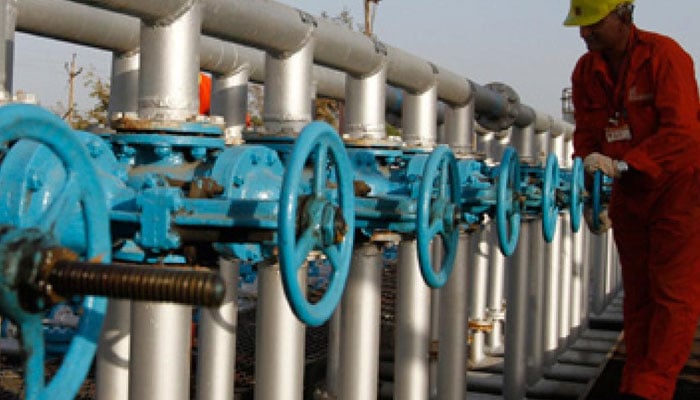‘Energy security hinges on LNG supply’
“If we take LNG out of the system, the similar situation of 2009 (energy crisis) will resurface,” Petroleum Division Secretary Mian Asad Hayaud Din told the senate standing committee on petroleum. Massive load-shedding would start again in case LNG imports are stopped, he said.
ISLAMABAD: Petroleum division on Wednesday linked the country’s energy security with a consistent supply of liquefied natural gas (LNG), forewarning massive power outages in case of any decision to stop the fuel import.
“If we take LNG out of the system, the similar situation of 2009 (energy crisis) will resurface,” Petroleum Division Secretary Mian Asad Hayaud Din told the senate standing committee on petroleum. Massive load-shedding would start again in case LNG imports are stopped, he said.
Hayaud Din said LNG is imported in line with the demand of power sector. LNG saved the country from massive energy crisis that hit the country a decade ago. Currently, imported gas is meeting around one-fourth of the country’s energy demand.
Petroleum division’s officials informed the committee that production of indigenous gas stood at four billion cubic feet per day (bcfd) against the total demand of six bcfd. It was informed that the country was importing LNG equivalent to 1.2 bcfd to meet the local requirements. There are currently two re-gasified liquefied natural gas (RLNG) terminals operating in the country.
Senator Nauman Wazir, however, criticised the government for importing LNG without ‘proper’ planning. Local gas production was kept on the lower side to pave way for LNG import that resulted in packing of the pipeline system of Sui Northern Gas Pipelines Limited.
“LNG is being imported more than the actual demand of the country,” Wazir said. RLNG’s share in energy mix sharply increased to near 25 percent last fiscal year from six percent in 2016/17. This helped the country reduce import of furnace oil whose share in power production was slashed to seven percent from as high as 30 percent during the period.
The country underwent worst energy crisis during the Pakistan Peoples Party-led government, hurting the economic growth. Public policy think tank Pakistan Institute of Development Economics said GDP growth dropped to 3.6 percent in 2013 from 5.8 percent in 2006 with growth rate of electricity generation falling to 1.5 percent from 11.8 percent during the period. An estimate said power outages had trimmed 2 percent of GDP.
The following government, led by Pakistan Muslim League-Nawaz, started focusing elimination of power crisis after coming into power in 2013. It succeeded in signing government-to-government LNG import deal with Qatar, and started importing the super-cool gas. RLNG-based power houses were established to tide over energy crisis.
Senator Wazir further raised the issue of appointment of executive directors in Oil and Gas Development Company Limited (OGDCL). He said the directors were not qualified but they were drawing million of rupees on account of salaries. OGDCL is run on ad hoc basis without permanent chief executive officer for the last five years. The current board of directors of OGDCL picked the candidates who were selected by the previous board one year back.
The senate standing committee on petroleum sought details of the directors and their perks and privileges.
The issue of regularising of some employees appointed in OGDCL under Aghaz-e-Huqooq-e-Balochistan was also raised during the meeting. The employees were hired on contract basis. They are yet to be regularised.
OGDCL Managing Director informed the committee that 85 employees were hired before the package. Nine engineers were employed under Aghaz-e-Huqooq-e-Balochistan. He said the Supreme Court ordered that employees should be regularised after test and interview.
Senator Wazir further demanded of the government that Khyber Pakhtunkhwa should be given 25 percent share in oil and gas reserves of OGDCL in the province.
Secretary petroleum, however, said provinces could not get share in such a way. It was informed that OGDCL was working on development of 11 new wells of oil and gas.
-
 Royal Family's Approach To Deal With Andrew Finally Revealed
Royal Family's Approach To Deal With Andrew Finally Revealed -
 Super Bowl Weekend Deals Blow To 'Melania' Documentary's Box Office
Super Bowl Weekend Deals Blow To 'Melania' Documentary's Box Office -
 Meghan Markle Shares Glitzy Clips From Fifteen Percent Pledge Gala
Meghan Markle Shares Glitzy Clips From Fifteen Percent Pledge Gala -
 Melissa Jon Hart Explains Rare Reason Behind Not Revisting Old Roles
Melissa Jon Hart Explains Rare Reason Behind Not Revisting Old Roles -
 Meghan Markle Eyeing On ‘Queen’ As Ultimate Goal
Meghan Markle Eyeing On ‘Queen’ As Ultimate Goal -
 Japan Elects Takaichi As First Woman Prime Minister After Sweeping Vote
Japan Elects Takaichi As First Woman Prime Minister After Sweeping Vote -
 Kate Middleton Insists She Would Never Undermine Queen Camilla
Kate Middleton Insists She Would Never Undermine Queen Camilla -
 King Charles 'terrified' Andrew's Scandal Will End His Reign
King Charles 'terrified' Andrew's Scandal Will End His Reign -
 Winter Olympics 2026: Lindsey Vonn’s Olympic Comeback Ends In Devastating Downhill Crash
Winter Olympics 2026: Lindsey Vonn’s Olympic Comeback Ends In Devastating Downhill Crash -
 Adrien Brody Opens Up About His Football Fandom Amid '2026 Super Bowl'
Adrien Brody Opens Up About His Football Fandom Amid '2026 Super Bowl' -
 Barbra Streisand's Obsession With Cloning Revealed
Barbra Streisand's Obsession With Cloning Revealed -
 What Did Olivia Colman Tell Her Husband About Her Gender?
What Did Olivia Colman Tell Her Husband About Her Gender? -
 'We Were Deceived': Noam Chomsky's Wife Regrets Epstein Association
'We Were Deceived': Noam Chomsky's Wife Regrets Epstein Association -
 Patriots' WAGs Slam Cardi B Amid Plans For Super Bowl Party: She Is 'attention-seeker'
Patriots' WAGs Slam Cardi B Amid Plans For Super Bowl Party: She Is 'attention-seeker' -
 Martha Stewart On Surviving Rigorous Times Amid Upcoming Memoir Release
Martha Stewart On Surviving Rigorous Times Amid Upcoming Memoir Release -
 Prince Harry Seen As Crucial To Monarchy’s Future Amid Andrew, Fergie Scandal
Prince Harry Seen As Crucial To Monarchy’s Future Amid Andrew, Fergie Scandal




